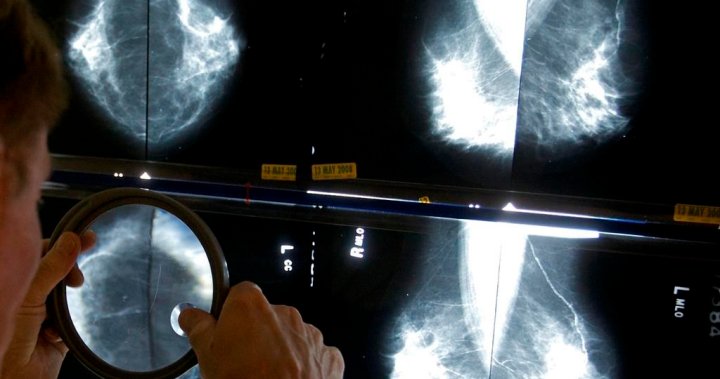
Begin breast cancer screening at age 40, Canadian Cancer Society urges
Global News
The Canadian Cancer Society (CCS) is urging all provinces and territories to begin breast cancer screening at age 40 for those at average risk of the disease.
The Canadian Cancer Society (CCS) is urging all provinces and territories to begin breast cancer screening at age 40 for those at average risk of the disease, ahead of a national guideline update set for later in May.
The current national guideline set by the Canadian Task Force on Preventive Health Care (CTFPHC) is to begin breast cancer screening at age 50.
“Over the last several years, there has been a groundswell of support for screening to begin at a younger age and for a more inclusive system – one that empowers people between the ages of 40 and 49, no matter where they live, to access screening without barriers,” CCS VP Dr Sandra Krueckl said in a statement Thursday.
“Lowering the starting age is an important step, allowing more breast cancers to be found earlier when treatment is likely to be more successful.”
The CTFPHC is an independent, federally appointed body that sets national guidelines used by family doctors to determine what kind of health screening patients require. According to its website, the task force comprises 15 primary care and prevention experts across Canada, such as family physicians, mental health experts and pediatricians.
It is ultimately the provinces and territories that say when screening should begin, though, and many have already lowered the beginning age to 40. The difference in ages in provincial and national guidelines can sometimes confuse physicians, some medical experts say.
Ontario announced in October that it will be lowering the starting age for screenings to 40, while B.C., Nova Scotia, P.E.I., and the Yukon have had the starting age at 40 for decades. New Brunswick recently changed its beginning age to 40 for screenings. A U.S. task force also recently changed its recommendations to age 40.
The CTFPHC last updated its guidelines in 2018 and said then that it opted not to lower the recommended age to begin screening to 40 due to concerns of over-diagnosis that would lead to unnecessary treatment.


















